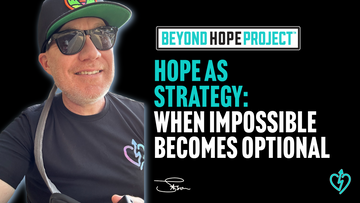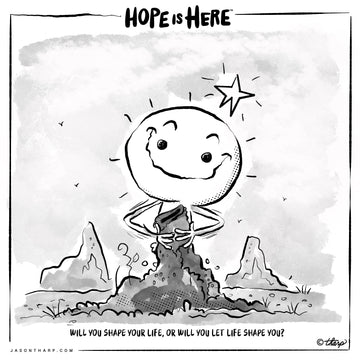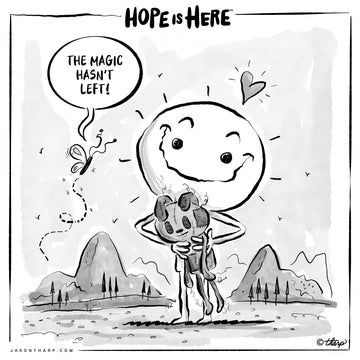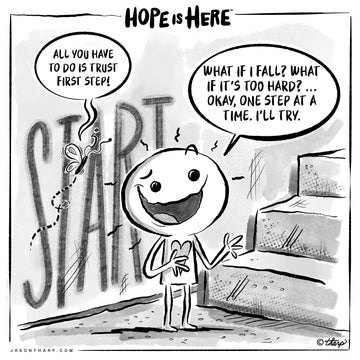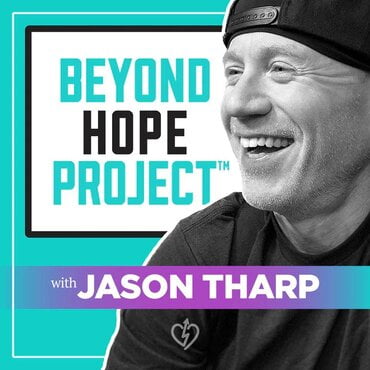There are moments in life when we're asked to stand in front of people who know suffering in ways most never will. Survivors. Caregivers. Healthcare professionals who witness the impossible every single day.
On October 29, I'll step onto the stage at the 4th Annual Sylvester Cancer Survivorship Symposium in Miami, not as someone who has all the answers, but as someone who learned to ask better questions. Questions like: What if hope isn't something we wait for? What if it's something we build?
The invitation came from Sylvester Comprehensive Cancer Center at the University of Miami, South Florida's only NCI-designated cancer center. This isn't just another medical institution. This is a place where science meets humanity, where research transforms into real lives saved, where the word "impossible" gets rewritten every day. Since earning their prestigious National Cancer Institute designation in 2019 and renewing it with an "Outstanding" score, Sylvester has become a beacon for what's possible when excellence meets compassion.
The symposium itself is a two-day gathering at The Ritz-Carlton Coconut Grove, bringing together survivors, caregivers, researchers, and clinicians. Day one focuses on supportive care sessions. Day two dives into scientific sessions featuring some of the brightest minds in survivorship research, including Dr. Supriya Mohile from the University of Rochester, who's revolutionizing care for older cancer survivors, and Dr. Jordan Marchak from Emory University, advancing pediatric and adolescent/young adult survivorship care.
And then there's my session: "Hope as Strategy: When Impossible Becomes Optional for Everyone."
Four years ago, I was told I had seven months to live. Grade 4 Glioblastoma. The kind of diagnosis that makes doctors look away. The kind that makes people whisper. The kind that's supposed to end stories, not begin them.
But here's what I've learned in the four years since that moment. Hope isn't a passive wish. It's a strategy. It's a deliberate, actionable framework that transforms how we move through the world, especially when the world tells us we can't move at all.
I call it the H.O.P.E. Algorithm:
Hyper-Aware. Not numb. Not distracted. Fully present to what is, not what we wish it were.
Open-Hearted. Vulnerable enough to feel everything, brave enough to love louder than fear speaks.
Persistent. Not stubborn. Not reckless. Committed to showing up, even when showing up feels impossible.
Empowering. Not just for ourselves, but for everyone around us. Because transformation is never a solo act.
This isn't just about cancer. This is about every moment we face the impossible and decide what to do next. Every time we're told "you can't" and we ask "why not?" Every time we choose to be the author of our own story instead of a passenger in someone else's narrative.
The people at Sylvester understand this. Their work isn't just about treating cancer. It's about what comes after. It's about survivorship, about quality of life, about helping people reclaim their humanity after it's been tested in ways no one should have to endure. Their Cancer Survivorship Program doesn't just extend lives. It helps people live them.
That's why this keynote matters.
Because in that room on October 29, there will be people who are tired. People who are scared. People who have been fighting so long they've forgotten what it feels like to not be at war.
And I want them to know something:
You're not broken. You're just waking up.
The impossible isn't a wall. It's a question. And the answer isn't found in avoiding the hard things. It's found in walking straight toward them with eyes wide open and hearts even wider.
Sylvester's symposium is creating space for these conversations. Space for the science and the soul. Space for the data and the humanity. Space for researchers to share breakthroughs and for survivors to share their truth. That intersection is where real transformation happens.
I'll be sharing my story, yes. The brain cancer. The Optune device I wear. The seven-month prognosis that became four years and counting. But more than that, I'll be sharing a framework. A way of thinking. A strategy for turning hope from something we feel into something we do.
Because that's what the people in that room need. Not platitudes. Not empty motivation. Not someone telling them to "stay positive" while they're navigating hell. They need tools. They need a map. They need to know that someone else walked through the fire and came out the other side, not unscathed, but transformed.
Sylvester's commitment to survivorship research is groundbreaking. They're not just asking how to help people survive cancer. They're asking how to help people thrive after it. How to address the physical, emotional, and psychological aftermath. How to support not just patients, but caregivers. How to turn survivorship from a label into a lived experience of possibility.
This symposium brings together minds like Dr. John-Jose Nunez, who's using artificial intelligence to improve supportive cancer care, bridging data science with human compassion. It features sessions on everything from geriatric oncology to pediatric survivorship, recognizing that cancer doesn't discriminate and neither should our approach to healing.
And in the middle of all that brilliance, all that research, all that science, I'll stand on that stage and talk about hope.
Not the kind of hope that's passive. Not the kind that waits for rescue. But the kind that builds its own ladder out of the pit. The kind that looks at "impossible" and says, "Let's find out."
Because here's the truth: Impossible is optional.
It's optional when we choose awareness over avoidance. It's optional when we choose vulnerability over armor. It's optional when we choose persistence over resignation. It's optional when we choose to empower not just ourselves, but everyone we encounter.
That's the message I'm bringing to Miami. That's the conversation I'm honored to be part of. And that's the invitation I'm extending to everyone who will be in that room and everyone reading these words right now.
You're allowed to rewrite the story you've been told. You're allowed to question the impossible. You're allowed to turn hope into strategy and strategy into transformation.
The 4th Annual Sylvester Cancer Survivorship Symposium isn't just an event. It's a declaration. A declaration that survivorship matters. That quality of life matters. That the human spirit, when given the right tools and the right community, is capable of things science can't fully explain.
I'm grateful to Sylvester for creating this space. I'm grateful to be part of this conversation. And I'm grateful to everyone who shows up, whether in person or in spirit, ready to discover that impossible is only impossible until someone proves otherwise.
See you in Miami.
Learn more about the Sylvester Cancer Survivorship Symposium and register HERE:

